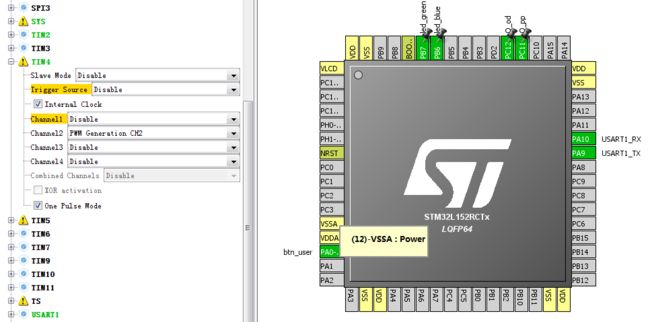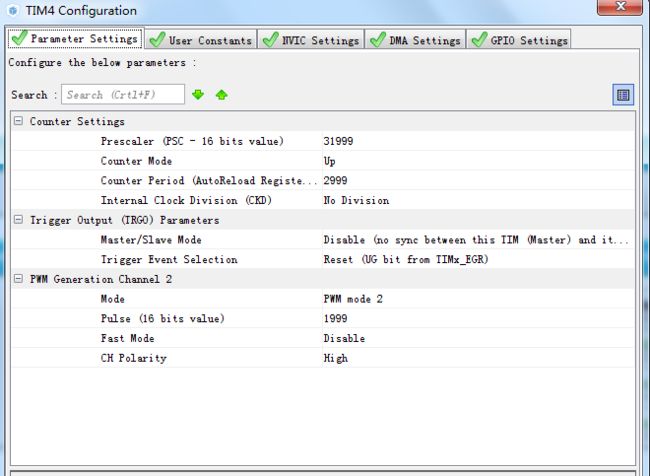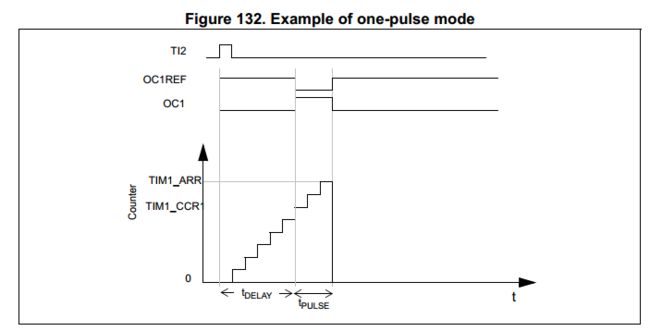- 第9章 空闲任务与阻塞延时的实现--总结
LS·Cui
freeRtosc语言物联网
整理野火《FreeRTOS内核实现与应用开发实战指南》—基于野火STM32全系列(M3/4/7)开发板文章目录第9章空闲任务与阻塞延时的实现9.1实现空闲任务9.1.1定义空闲任务的栈9.1.2定义空闲任务的任务控制块9.1.3创建空闲任务9.2实现阻塞延时9.2.1vTaskDelay()函数9.2.2修改vTaskSwitchContext()函数9.3SysTick中断服务函数9.3.1xT
- VScode使用笔记
我的老子姓彭
vscode笔记ide
VScode打开keil工程的配置[STM32]从零开始的vscode连接keil教程_vscode配置keil环境-CSDN博客补充:包含头文件vscode编辑keilarm工程中遇到的问题以及解决方法-了不起的亮亮-博客园
- STM32/GD32同类别芯片编号标识字段释义
Awen_y
单片机之路stm32单片机嵌入式硬件
嵌入式_STM32/GD32同类别芯片编号标识字段释义`STM32或国产GD32的产品都有个16个字母或数字构成的编号标示,该标识各个字段表示什么意思,这里整理一下方便自己查阅选型和配置文章目录嵌入式_STM32/GD32同类别芯片编号标识字段释义前言一、型号说明二、下载器线序总结前言这里依意法半导体公司32位单片机GD32F103CBT6为例:其中32表示:单片机字长,决定了处理器一次可处理的的
- STM32+CubeMX -- 开发辅助工具
【 STM32开发 】
stm32嵌入式硬件单片机
下面是开发时,每天高频用到的几款工具:一、串口助手单片机在调试程序时,用得最多的调试方式,并非是进入debug模式,而是:观察LED的不同设定状态,如:亮、灭、常亮、快闪、慢闪等;使用UART,经USB转TTL,把数据输出到串口助手观察,比进入debug观察数据更清晰、直观。网盘文件夹中提供了几款串口助手,直接复制到桌面上,即可使用。也可以从这里下载:链接:串口助手集合:XCOM-v3.0、SSC
- stm32内存溢出怎么办
嵌入式小强工作室
stm32java嵌入式硬件
STM32内存溢出是一个常见的问题,可能由多种原因引起,如数组定义过大、函数调用层级过深、堆栈空间不足等。针对这个问题,可以采取以下几种解决方法:一、增加堆栈大小堆栈溢出通常是由于堆栈空间不足以容纳函数调用和局部变量的信息。因此,增加堆栈大小是一种有效的解决方法。在STM32的工程中,可以通过修改链接脚本文件(.ld文件)中的堆栈大小参数来增加堆栈空间。通常,堆栈大小设置为RAM的一小部分,但需要
- 在stm32中C语言编写的程序中,一个整形数据是怎么存储的,高位在前还是低位在前
魂兮-龙游
嵌入式C语言开发stm32c语言java
目录举个例子如何验证小结在STM32(基于ARMCortex-M架构)的系统中,默认是小端(LittleEndian)存储方式。也就是说,对于一个整型(例如32位int),它的最低有效字节(LSB)会存储在内存的低地址处,而最高有效字节(MSB)会存储在内存的高地址处。举个例子假设有一个32位的intdata=0x12345678;在小端模式下,内存中的存放顺序从低地址到高地址依次是:低地址->0
- STM32 GPIO
2401-
stm32单片机嵌入式硬件
GPIO简介GPIO(GeneralPurposeInputOutput)通用输入输出口可配置为8种输入输出模式引脚电平:0V~3.3V,部分引脚可容忍5V输出模式下可控制端口输出高低电平,用以驱动LED、控制蜂鸣器、模拟通信协议输出时许等。输入模式下可读取端口的高低电平或者电压,用于读取按键输入、外接模块电平信号输入、ADC电压采集、模拟通信协议接受数据等。系统结构寄存器:是一段特殊的存储器,内
- 用ESP-IDF驱动WS2812
楚谭
ESP-IDFc语言
WS2812b(54条消息)ESP32学习】驱动ws2812_sidongshi的博客-CSDN博客_esp32ws2812关于LED看这个资料吧,我不再继续说明ESP-IDF这个也初学,不太熟悉其中编译原理,大概说一下延时问题inti;for(i=0;i<(20);i++);关于纳秒级别延时函数,上面这段代码在72M的stm32103中大概是延时1.4ns左右,但是在ESP-IDF中这种写法会被
- 05 STM32寄存器开发基础-串口编程
DS小龙哥
智能家居与物联网项目实战stm32嵌入式硬件单片机串口编程
文章目录一、前言二、系列文章三、如何学习?四、STM32编程-配置串口4.1STM32开发板4.2原理图4.3STM32的GPIO口4.4开时钟4.5配置GPIO模式的寄存器4.6配置串口参数的寄存器4.7初始化串口1:实现数据发送4.8初始化串口1:实现数据接收4.9初始化串口1:支持printf打印4.10初始化串口1:实现中断接收数据4.10初始化串口1:实现不定长数据接收一、前言这篇文章学
- clion配置stm32开发环境
行走的bug...
单片机嵌入式硬件c++c语言
一些说明:安装cubeide时报errorlaunchinginstaller是因为目录名有中文的缘故。其实这里用不到cubeIDE,这个就是为了记录一下。能正确配置好环境后就能生成hex文件了,然后用stm32st-linkutility程序烧录就OK了环境准备:1、clion,注意clion默认带有cmake,每个版本的clion都支持一个范围的cmake,比如2021版的clion最高支持3
- STM32标准库工程中移植TencentOS-tiny
Mculover666
TencentOS-tinystm32
一、移植前的准备1.引言因为项目的原因需要将原有的标准库工程升级为基于TencentOS-tiny的RTOS工程,所以花费一点时间记录移植过程,提供一份向基于STM32标准库的老工程中移植TencentOS-tiny的思路。2.移植条件移植TencentOS-tiny需要确保Systick可以正常工作:①Systick用于向TencentOS-tiny提供时钟节拍支持,通常为1ms一次中断;②Sy
- 野火STM32F103学习笔记
世事如云有卷舒
嵌入式stm32学习笔记
相关知识点总结:ISP(In-SystemProgramming):用于对已经安装到目标系统中的芯片进行编程或烧录。IAP(In-ApplicationProgramming):允许嵌入式设备内部的应用程序或固件对自身进行编程或更新。ICP(In-CircuitProgramming):用于在组装完成的电路板上,对已经焊接的芯片进行编程。(stm32串口1才具有下载功能)JTAG:JTAG接口是一
- 全面解读STM32F103和STM32F107手册与Cortex-M3架构
脑叔
本文还有配套的精品资源,点击获取简介:基于ARM的Cortex-M3内核的STM32系列微控制器在嵌入式系统、物联网和工业控制领域得到广泛应用。STM32F103和STM32F107是该系列中的两款产品,前者面向中低端市场,后者增加USBOTG功能。Cortex-M3架构以其高效能、低功耗著称,支持Thumb-2指令集、内建浮点单元(FPU)和快速中断响应,适合于便携式设备。理解STM32F103
- 【单片机程序架构】时间片任务轮询调度算法架构
阿齐Archie
嵌入式软件单片机项目合集单片机架构嵌入式硬件
前言:博主总结三步完成搭建单片机时间片任务轮询调度程序架构,以STM32F1和STM32F4系列单片机讲解。目录程序架构1、配置计时基准时间2、定义调度功能函数3、主函数中使用4、main.c主程序文件架构理论程序架构分为以下三步:1、配置计时基准时间2、定义调度功能函数3、主函数中使用1、配置计时基准时间1.首先是配置定时器中断(也可以用系统滴答定时器,本文使用自己配置的定时器TIM2),根据定
- 从零开始的stm32最小系统板——(4)启动模式
小程不睡觉
stm32最小系统板stm32嵌入式硬件单片机
一、stm32的三种启动方式stm32有3种自举模式,也叫启动方式,不同的启动方式对应有不同应用。如何确定不同的启动方式,其实是通过stm32的boot1和boot0引脚的电平情况决定的。下面给出一张表:在我们stm32启动的时候,其实做了一件事情,就是从地址0x00000000取出堆栈指针MSP的值这个值就是栈顶地址,然后从0x00000004取出程序计数器PC的值,这个值就是复位向量。为什么要
- STM32 GPIO工作模式设置
LLLLLLZZZZZZHHHHHH
stm32单片机
用于自学,有错请指出!!!引脚模式选择(GPIO_Mode)1、浮空输入:GPIO_Mode_IN_FLOATING引脚自身视为开路,电平由外部电路决定,不能输出;2、上拉输入:GPIO_Mode_IPU当外部电平不确定时,会被拉至高电平;3、下拉输入:GPIO_Mode_IPD当外部电平不确定时,会被拉至低电平;4、模拟输入:GPIO_Mode_AIN用作内部AD采样脚;5、通用开漏输出:GPI
- STM32 F4xx LL库定时器主从触发
sayang_shao
stm32嵌入式硬件单片机
LL_APB1_GRP1_EnableClock(LL_APB1_GRP1_PERIPH_TIM2);LL_APB1_GRP1_EnableClock(LL_APB1_GRP1_PERIPH_TIM3);/*Slavetimerinit*/LL_TIM_SetCounterMode(TIM3,LL_TIM_COUNTERMODE_UP);LL_TIM_SetPrescaler(TIM3,0);LL
- STM32学习和实践笔记(28):printf重定向实验
复业思维20240108
STM32stm32学习笔记
1.printf重定向简介在C语言中printf函数里,默认输出设备是显示器,如果想要用这个函数将输出结果到串口或者LCD上显示,就必须重定义标准库函数里中printf函数调用的与输出设备相关的函数。比如要使用printf输出到串口,需要先将fputc函数里面的输出指向串口,这个更改就叫重定向。
- STM32CubeIDE 的应用: 重定向printf 到stm32串口
logan_lei
stm32uart串口通信
一。导入stdio.h库文件/*Privateincludes----------------------------------------------------------*//*USERCODEBEGINIncludes*/#include/*USERCODEENDIncludes*/二。重写函数/*USERCODEBEGIN4*/#ifdef__GNUC__#definePUTCHAR_
- STM32F1与STM32CubeIDE快速入门-USB虚拟串口(CDC)
视觉与物联智能
物联网全栈开发实战STM32STM32CubeIDEUSB嵌入式硬件物联网
USB虚拟串口(CDC)文章目录USB虚拟串口(CDC)1、USB虚拟串口配置2、USB虚拟串口驱动实现3、运行结果4、STM32F1与STM32CubeIDE系列文章4.1STM32F1与STM32CubeIDE快速入门4.2STM32F1与STM32CubeIDE编程实例STM32F1USB外设实现了USB2.0全速总线和APB1总线间的接口。USB提供的串行接口,具有以下特点:1)简单性和灵
- (6)STM32 USB设备开发-USB键鼠一体设备
andylauren
STM32USB设备开发stm32嵌入式硬件单片机
例程:STM32USBdevice:基于STM32的USB设备例子程序-Gitee.com键鼠一体的应用场景如集合器,比如我们在网上购买的键鼠套装,是将2.4G集合到一个USB接收器中,这个USB接收器对于PC来说就是一个键鼠一体设备。或者我们可以自制一个带有鼠标摇杆的键盘等场景。键鼠一体实现方式是在报告描述符中描述两个设备,即键盘设备和鼠标设备,报告描述就是将键盘描述和鼠标描述何为一个,那么PC
- 【HAL库】STM32CubeMX开发----STM32F407----USB实验(CDC虚拟串口)
根号五
#嵌入式开发stm32单片机HAL库STM32CubeMXUSB
STM32CubeMX下载和安装详细教程【HAL库】STM32CubeMX开发----STM32F407----目录STM32F407-HAL库:USB实验(CDC虚拟串口)-程序源码前言本次实验以STM32F407VET6芯片为MCU,使用25MHz外部时钟源。USB通信引脚与MCU引脚对应关系如下:USB通信引脚MCU引脚DM(D-)PA11DP(D+)PA12原理图
- STM32更新程序OTA
嵌入式小强工作室
stm32嵌入式硬件单片机
STM32的OTA(Over-The-Air)更新程序是一种通过无线通信方式,为设备分发新软件、配置甚至更新加密密钥的技术。以下是关于STM32OTA更新程序的详细介绍:一、OTA升级流程STM32的OTA升级流程通常包括以下几个关键步骤:固件打包:在进行OTA升级之前,开发人员需要将新的固件代码编译成二进制文件。为了确保文件的完整性和安全性,通常会添加校验码(如MD5或SHA-1)。服务器部署:
- 02 STM32F103 USB固件开发-移植JoyStickMouse(1)
yplinux
基于STUSB固件库STM32F103USB设备开发stm32嵌入式硬件单片机
STM32F103USB固件开发-移植JoyStickMouse(1)文章目录STM32F103USB固件开发-移植JoyStickMouse(1)1.STUSB固件库介绍2.移植JoyStickMouse例程3.备注1.STUSB固件库介绍下载的固件库是:en.stsw-stm32121.zip目录结构介绍如下:2.移植JoyStickMouse例程2.1把STM32_USB-FS-Device
- 学习STM32的USB通信
MyM满满
学习stm32嵌入式硬件
STM32是一款广泛应用于嵌入式系统开发的微控制器系列,其具备丰富的外设和强大的计算能力。其中USB通信作为一种常见的外设通信方式,广泛应用于各类嵌入式系统中,特别是在PC与嵌入式设备之间的数据传输和通信中。本文将详细介绍STM32的USB通信的相关知识,并通过代码案例来演示如何在STM32中实现USB通信。一、STM32USB通信的基础知识USB协议简介USB(UniversalSerialBu
- 基于STM32设计的WiFi语音播报日程表
DS小龙哥
智能家居与物联网项目实战stm32单片机嵌入式硬件
1.前言近年来,随着电子产品的发展,数字日程表这项应用在人们工作和生活中起到越来越重要的作用。时间对人们来说总是那么宝贵,工作的忙碌性和繁杂性容易使人忘记当前的时间,忘记了要做的事情,当事情不是很重要的时候,这种遗忘无伤大雅。但是,遇上重要事务,一时的耽误可能酿成大祸。因此从人们的日常生活到公司办公,从台式电脑到便携式智能手机,都要求标配上日程表的作用。人们要求随时随地都能快速准确的提醒当前事务,
- STM32特殊功能引脚详解文章·STM32特殊功能引脚能当作GPIO使用嘛详解!!!
看,是大狗
嵌入式硬件STM32特殊功能引脚STM32特殊功能引脚详解文章STM32特殊功能引脚服用STM32AFIO特殊引脚
目录STM32特殊功能引脚使用STM32特殊功能引脚函数禁止搬运,仅供学习,编写不易,感谢理解!!!STM32特殊功能引脚本篇详解文章仅以STM32F103C8T6芯片来讲解,STM32芯片除了普通的GPIO引脚以外,还有专门的特殊功能引脚,这些特殊功能引脚用于晶振信号的输入,控制单片机的复位,Booto引脚,芯片的烧录,还有备份电源区域。这些特殊功能引脚给外界提供了,调试跟控制STM32芯片的方
- 【STM32F1例程5】RT-THREAD实验
不会计算机的g_c__b
嵌入式开发stm32嵌入式硬件单片机
解释说明这个概念还是想唠叨一下(个人总结,仅供参考)!!!RT-Thread是一个开源的、中英文双语的、面向嵌入式系统领域的实时操作系统(RTOS)。它具备以下特点:1.轻量级:RT-Thread的内核非常小,整个内核的代码量不足3K,可以运行在各种资源受限的嵌入式硬件上。2.可伸缩性:RT-Thread可以运行在从几百字节内存的8051到大型的ARM7以及更高性能的处理器上。3.实时性:作为一个
- 最全复习嵌入式STM32知识点总结
One Kb
STM32入门基础stm32嵌入式硬件单片机
STM32F103系列STM32:芯片系列F:芯片类型103:芯片子系列R:引脚数目B:FLASH容量T:封装信息6:工作温度范围STM32:系统内核小、专用性强、系统精简Lx系列:低功耗F0/1/3系列:均衡型F2/4/7系列:高性能ARMCortex-M3处理器系列基于ARMv7架构的产品STM32F103ZET6有7个端口(A、B、C、D、E、F、G),每个端口16个引脚(0~15)采用哈佛
- 单片机/嵌入式软件架构分层思想
Dr_Haven
代码规范单片机
以STM32裸机开发为例。软件分层应用层驱动层硬件层固件层①最底层为固件层,Firmware这一层通常是官方给的库,库函数对寄存器进行操作,例如:/***@briefTransmitsaDatathroughtheSPIx/I2Sxperipheral.*@paramSPIx:wherexcanbe*-1,2or3inSPImode*-2or3inI2Smode*@paramData:Datato
- xml解析
小猪猪08
xml
1、DOM解析的步奏
准备工作:
1.创建DocumentBuilderFactory的对象
2.创建DocumentBuilder对象
3.通过DocumentBuilder对象的parse(String fileName)方法解析xml文件
4.通过Document的getElem
- 每个开发人员都需要了解的一个SQL技巧
brotherlamp
linuxlinux视频linux教程linux自学linux资料
对于数据过滤而言CHECK约束已经算是相当不错了。然而它仍存在一些缺陷,比如说它们是应用到表上面的,但有的时候你可能希望指定一条约束,而它只在特定条件下才生效。
使用SQL标准的WITH CHECK OPTION子句就能完成这点,至少Oracle和SQL Server都实现了这个功能。下面是实现方式:
CREATE TABLE books (
id &
- Quartz——CronTrigger触发器
eksliang
quartzCronTrigger
转载请出自出处:http://eksliang.iteye.com/blog/2208295 一.概述
CronTrigger 能够提供比 SimpleTrigger 更有具体实际意义的调度方案,调度规则基于 Cron 表达式,CronTrigger 支持日历相关的重复时间间隔(比如每月第一个周一执行),而不是简单的周期时间间隔。 二.Cron表达式介绍 1)Cron表达式规则表
Quartz
- Informatica基础
18289753290
InformaticaMonitormanagerworkflowDesigner
1.
1)PowerCenter Designer:设计开发环境,定义源及目标数据结构;设计转换规则,生成ETL映射。
2)Workflow Manager:合理地实现复杂的ETL工作流,基于时间,事件的作业调度
3)Workflow Monitor:监控Workflow和Session运行情况,生成日志和报告
4)Repository Manager:
- linux下为程序创建启动和关闭的的sh文件,scrapyd为例
酷的飞上天空
scrapy
对于一些未提供service管理的程序 每次启动和关闭都要加上全部路径,想到可以做一个简单的启动和关闭控制的文件
下面以scrapy启动server为例,文件名为run.sh:
#端口号,根据此端口号确定PID
PORT=6800
#启动命令所在目录
HOME='/home/jmscra/scrapy/'
#查询出监听了PORT端口
- 人--自私与无私
永夜-极光
今天上毛概课,老师提出一个问题--人是自私的还是无私的,根源是什么?
从客观的角度来看,人有自私的行为,也有无私的
- Ubuntu安装NS-3 环境脚本
随便小屋
ubuntu
将附件下载下来之后解压,将解压后的文件ns3environment.sh复制到下载目录下(其实放在哪里都可以,就是为了和我下面的命令相统一)。输入命令:
sudo ./ns3environment.sh >>result
这样系统就自动安装ns3的环境,运行的结果在result文件中,如果提示
com
- 创业的简单感受
aijuans
创业的简单感受
2009年11月9日我进入a公司实习,2012年4月26日,我离开a公司,开始自己的创业之旅。
今天是2012年5月30日,我忽然很想谈谈自己创业一个月的感受。
当初离开边锋时,我就对自己说:“自己选择的路,就是跪着也要把他走完”,我也做好了心理准备,准备迎接一次次的困难。我这次走出来,不管成败
- 如何经营自己的独立人脉
aoyouzi
如何经营自己的独立人脉
独立人脉不是父母、亲戚的人脉,而是自己主动投入构造的人脉圈。“放长线,钓大鱼”,先行投入才能产生后续产出。 现在几乎做所有的事情都需要人脉。以银行柜员为例,需要拉储户,而其本质就是社会人脉,就是社交!很多人都说,人脉我不行,因为我爸不行、我妈不行、我姨不行、我舅不行……我谁谁谁都不行,怎么能建立人脉?我这里说的人脉,是你的独立人脉。 以一个普通的银行柜员
- JSP基础
百合不是茶
jsp注释隐式对象
1,JSP语句的声明
<%! 声明 %> 声明:这个就是提供java代码声明变量、方法等的场所。
表达式 <%= 表达式 %> 这个相当于赋值,可以在页面上显示表达式的结果,
程序代码段/小型指令 <% 程序代码片段 %>
2,JSP的注释
<!-- -->
- web.xml之session-config、mime-mapping
bijian1013
javaweb.xmlservletsession-configmime-mapping
session-config
1.定义:
<session-config>
<session-timeout>20</session-timeout>
</session-config>
2.作用:用于定义整个WEB站点session的有效期限,单位是分钟。
mime-mapping
1.定义:
<mime-m
- 互联网开放平台(1)
Bill_chen
互联网qq新浪微博百度腾讯
现在各互联网公司都推出了自己的开放平台供用户创造自己的应用,互联网的开放技术欣欣向荣,自己总结如下:
1.淘宝开放平台(TOP)
网址:http://open.taobao.com/
依赖淘宝强大的电子商务数据,将淘宝内部业务数据作为API开放出去,同时将外部ISV的应用引入进来。
目前TOP的三条主线:
TOP访问网站:open.taobao.com
ISV后台:my.open.ta
- 【MongoDB学习笔记九】MongoDB索引
bit1129
mongodb
索引
可以在任意列上建立索引
索引的构造和使用与传统关系型数据库几乎一样,适用于Oracle的索引优化技巧也适用于Mongodb
使用索引可以加快查询,但同时会降低修改,插入等的性能
内嵌文档照样可以建立使用索引
测试数据
var p1 = {
"name":"Jack",
"age&q
- JDBC常用API之外的总结
白糖_
jdbc
做JAVA的人玩JDBC肯定已经很熟练了,像DriverManager、Connection、ResultSet、Statement这些基本类大家肯定很常用啦,我不赘述那些诸如注册JDBC驱动、创建连接、获取数据集的API了,在这我介绍一些写框架时常用的API,大家共同学习吧。
ResultSetMetaData获取ResultSet对象的元数据信息
- apache VelocityEngine使用记录
bozch
VelocityEngine
VelocityEngine是一个模板引擎,能够基于模板生成指定的文件代码。
使用方法如下:
VelocityEngine engine = new VelocityEngine();// 定义模板引擎
Properties properties = new Properties();// 模板引擎属
- 编程之美-快速找出故障机器
bylijinnan
编程之美
package beautyOfCoding;
import java.util.Arrays;
public class TheLostID {
/*编程之美
假设一个机器仅存储一个标号为ID的记录,假设机器总量在10亿以下且ID是小于10亿的整数,假设每份数据保存两个备份,这样就有两个机器存储了同样的数据。
1.假设在某个时间得到一个数据文件ID的列表,是
- 关于Java中redirect与forward的区别
chenbowen00
javaservlet
在Servlet中两种实现:
forward方式:request.getRequestDispatcher(“/somePage.jsp”).forward(request, response);
redirect方式:response.sendRedirect(“/somePage.jsp”);
forward是服务器内部重定向,程序收到请求后重新定向到另一个程序,客户机并不知
- [信号与系统]人体最关键的两个信号节点
comsci
系统
如果把人体看做是一个带生物磁场的导体,那么这个导体有两个很重要的节点,第一个在头部,中医的名称叫做 百汇穴, 另外一个节点在腰部,中医的名称叫做 命门
如果要保护自己的脑部磁场不受到外界有害信号的攻击,最简单的
- oracle 存储过程执行权限
daizj
oracle存储过程权限执行者调用者
在数据库系统中存储过程是必不可少的利器,存储过程是预先编译好的为实现一个复杂功能的一段Sql语句集合。它的优点我就不多说了,说一下我碰到的问题吧。我在项目开发的过程中需要用存储过程来实现一个功能,其中涉及到判断一张表是否已经建立,没有建立就由存储过程来建立这张表。
CREATE OR REPLACE PROCEDURE TestProc
IS
fla
- 为mysql数据库建立索引
dengkane
mysql性能索引
前些时候,一位颇高级的程序员居然问我什么叫做索引,令我感到十分的惊奇,我想这绝不会是沧海一粟,因为有成千上万的开发者(可能大部分是使用MySQL的)都没有受过有关数据库的正规培训,尽管他们都为客户做过一些开发,但却对如何为数据库建立适当的索引所知较少,因此我起了写一篇相关文章的念头。 最普通的情况,是为出现在where子句的字段建一个索引。为方便讲述,我们先建立一个如下的表。
- 学习C语言常见误区 如何看懂一个程序 如何掌握一个程序以及几个小题目示例
dcj3sjt126com
c算法
如果看懂一个程序,分三步
1、流程
2、每个语句的功能
3、试数
如何学习一些小算法的程序
尝试自己去编程解决它,大部分人都自己无法解决
如果解决不了就看答案
关键是把答案看懂,这个是要花很大的精力,也是我们学习的重点
看懂之后尝试自己去修改程序,并且知道修改之后程序的不同输出结果的含义
照着答案去敲
调试错误
- centos6.3安装php5.4报错
dcj3sjt126com
centos6
报错内容如下:
Resolving Dependencies
--> Running transaction check
---> Package php54w.x86_64 0:5.4.38-1.w6 will be installed
--> Processing Dependency: php54w-common(x86-64) = 5.4.38-1.w6 for
- JSONP请求
flyer0126
jsonp
使用jsonp不能发起POST请求。
It is not possible to make a JSONP POST request.
JSONP works by creating a <script> tag that executes Javascript from a different domain; it is not pos
- Spring Security(03)——核心类简介
234390216
Authentication
核心类简介
目录
1.1 Authentication
1.2 SecurityContextHolder
1.3 AuthenticationManager和AuthenticationProvider
1.3.1 &nb
- 在CentOS上部署JAVA服务
java--hhf
javajdkcentosJava服务
本文将介绍如何在CentOS上运行Java Web服务,其中将包括如何搭建JAVA运行环境、如何开启端口号、如何使得服务在命令执行窗口关闭后依旧运行
第一步:卸载旧Linux自带的JDK
①查看本机JDK版本
java -version
结果如下
java version "1.6.0"
- oracle、sqlserver、mysql常用函数对比[to_char、to_number、to_date]
ldzyz007
oraclemysqlSQL Server
oracle &n
- 记Protocol Oriented Programming in Swift of WWDC 2015
ningandjin
protocolWWDC 2015Swift2.0
其实最先朋友让我就这个题目写篇文章的时候,我是拒绝的,因为觉得苹果就是在炒冷饭, 把已经流行了数十年的OOP中的“面向接口编程”还拿来讲,看完整个Session之后呢,虽然还是觉得在炒冷饭,但是毕竟还是加了蛋的,有些东西还是值得说说的。
通常谈到面向接口编程,其主要作用是把系统��设计和具体实现分离开,让系统的每个部分都可以在不影响别的部分的情况下,改变自身的具体实现。接口的设计就反映了系统
- 搭建 CentOS 6 服务器(15) - Keepalived、HAProxy、LVS
rensanning
keepalived
(一)Keepalived
(1)安装
# cd /usr/local/src
# wget http://www.keepalived.org/software/keepalived-1.2.15.tar.gz
# tar zxvf keepalived-1.2.15.tar.gz
# cd keepalived-1.2.15
# ./configure
# make &a
- ORACLE数据库SCN和时间的互相转换
tomcat_oracle
oraclesql
SCN(System Change Number 简称 SCN)是当Oracle数据库更新后,由DBMS自动维护去累积递增的一个数字,可以理解成ORACLE数据库的时间戳,从ORACLE 10G开始,提供了函数可以实现SCN和时间进行相互转换;
用途:在进行数据库的还原和利用数据库的闪回功能时,进行SCN和时间的转换就变的非常必要了;
操作方法: 1、通过dbms_f
- Spring MVC 方法注解拦截器
xp9802
spring mvc
应用场景,在方法级别对本次调用进行鉴权,如api接口中有个用户唯一标示accessToken,对于有accessToken的每次请求可以在方法加一个拦截器,获得本次请求的用户,存放到request或者session域。
python中,之前在python flask中可以使用装饰器来对方法进行预处理,进行权限处理
先看一个实例,使用@access_required拦截:
?


